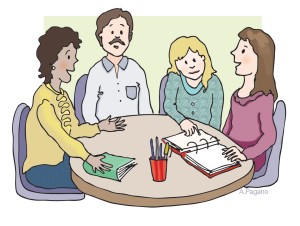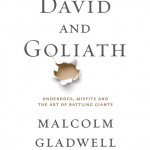 Few people would disagree that communication is essential in sharing concepts and ideas, however, effective communication often seems to elude the masses. Many books and motivational speakers have touched on the subject in one way or another, yet properly passing along information and having it received as intended is not an easy task; miscommunication is. So, how could it be in a world where communication is shared so readily and easily, that people can still be so misunderstood? Most teachers excel in classroom communication and parental communication, yet it is in teacher to teacher or teacher to administrator communication where we seem to have lost the art. How can we as educators effectively communicate to each other allowing for ideas to be shared and understood while minimizing blunders, arguments and hurt feelings?
Few people would disagree that communication is essential in sharing concepts and ideas, however, effective communication often seems to elude the masses. Many books and motivational speakers have touched on the subject in one way or another, yet properly passing along information and having it received as intended is not an easy task; miscommunication is. So, how could it be in a world where communication is shared so readily and easily, that people can still be so misunderstood? Most teachers excel in classroom communication and parental communication, yet it is in teacher to teacher or teacher to administrator communication where we seem to have lost the art. How can we as educators effectively communicate to each other allowing for ideas to be shared and understood while minimizing blunders, arguments and hurt feelings?
According to Webster’s Dictionary, Communication is “The act or process of using words, sounds, signs or behaviors to express or exchange information or to express your ideas, thoughts, feelings, etc., to someone else.
I recently went to a meeting lead by our school’s Curriculum Director that was based on the book, Courage to Teach, by Parker J. Palmer. Before the meeting began and the “welcomes” were too far underway, she pulled out a sheet that had ten “Touchstones” on them that were written by the author and were stated to “Increase the likelihood of our working together productively”. I was so impressed by these ten “Touchstones,” that I decided that every meeting in the world could benefit from these guidelines if they were modified just a bit to fit every type of meeting; large or small, corporate or personal. I also realized that these rules (or ideas) were really based on the fine art of communication, of being understood, and that if we simply put them into practice, the likelihood of our communication skills…of being understood…would also increase.
Touchstones: Ten ideas to increase the likelihood of our working together and communicating more productively (modified):
Be 100% Present: Set aside the usual distractions of things undone or due tomorrow. Be all there to be able to promote a productive meeting.
Be Welcoming to All: The meeting process works most efficiently when all feel welcome. Welcome others and presume that you yourself are welcome as well. Remember it takes all types of people to bring about flavorful solutions.
Listen Deeply: Listen to the words beneath the words. Listening to each other may be the greatest service that any human being ever performs for another person. Listen to yourself as well. Strive to achieve a balance between listening and reflecting, speaking and acting.
How and When to Share: No one should ever be made to share, but everyone should be welcomed and even invited to share. On the other hand, speaking too much hurts productivity because only one voice is being heard. Resist the urge to speak at every turn by remembering to listen twice as much as you speak.
Suspend Judgment & Identify Assumptions: By creating space between judgments and reactions, we can listen to others and to ourselves more fully. Our assumptions are usually invisible to us, yet they undergird our worldview. By identifying our assumptions, we can then set them aside and open our viewpoints to greater possibilities.
Speak Your Truth. You are invited to say what is in your heart, trusting that your voice will be heard and your contribution respected. Your truth may be different from or even the opposite from what another person in the meeting has said. Yet speaking your truth is simply that, it is not debating with, or correcting, or interpreting what another person has said. Own your truth by remembering to speak only for yourself. Use “I” statements rather than “you” or “everyone”. This clearly communicates the personal nature of your expression.
Respect Silence: After someone has spoken, take time to reflect without immediately filling the space with words. This allows others time to fully listen before reflecting on their own reactions.
Maintain Confidentiality. Create a safe space by respecting the confidential nature and content of discussions held in the formation circle. Allow what is said in the circle to remain there.
Everyone’s Words Matter: In a meeting, if someone is made to feel that their comment was not welcome, then they and others in the meeting will begin to shut down allowing for free conversation and unique ideas to cease. Remember to never give a tone of shame or disapproval for what has been said, no matter how much you disagree. Maintain a professional status; recite what was being said back to the person to check for understanding and then acknowledge that they have been heard without judgment.
Seek Solutions: If you present a problem at a meeting, always have possible solutions in mind if you can. If you find yourself disagreeing with another person, ask yourself, “I wonder what brought him or her to this place.” “I wonder what my reaction teaches me.” “I wonder what they’re feeling right now?” “What brought them to say what they said?” Seek solutions to issues rather than judging them. If someone was brave enough to share a concern, try to discover why they feel it is a concern and then get to the bottom of it without judgment or a tone of disapproval.
In the world of communication conundrums, there are ways to speak and be understood, it just takes drive, desire and practice. If we seek to understand where others are coming from, and listen intently beyond what is being said, we may have just reached the first level to effective communication…teacher to teacher.





Leave a comment